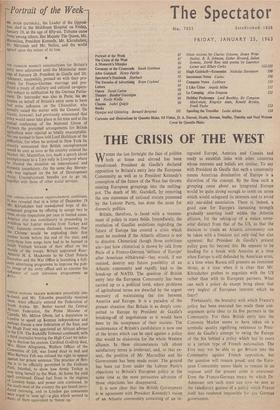— Portrait of the Week— MR. HUGH GAITSKELL, the Leader of
the Opposi- tion, died in the Middlesex Hospital on Friday, January 19, at the age of fifty-six. Tributes came from,'among others, Her Majesty The Queen, Mr. Macmillan, President Kennedy, Mr. Khrushchev, Dr. Nkrumah and Mr. Nehru, and the world agreed upon the extent of its loss.
THE COMMON MARKET NEGOTIATIONS for Britain's entry were adjourned until the Ministerial meet- ings of January 28. President de Gaulle and Dr. Adenauer, meanwhile, pressed on with their pro- posals for Franco-German marriage and pro- duced a treaty of military and cultural co-opera- tion subject to ratification by the German Parlia- ment. Dr. Schroeder was also in Paris; his en- treaties on behalf of Britain's entry seem to have had some influence on the Chancellor, who actually raised the matter with the General. De Gaulle, however, had previously announced that entry would never take place in his time and at the annual conference of the National Union of Farmers the presumed arrangements for British agriculture were rejected as totally unacceptable. No one seemed to have told Lord Hailsham of the difficulties, for when he arrived in New York he cheerily announced that British unemployment would be over as soon as the country entered the Market. Mr. Macmillan, too, made a speech about unemployment to a Tory rally in Liverpool where he blamed the situation on international and domestic uncertainty. On the same day Mersey- side was replaced on the list of Development Areas. Unemployment benefits are to go up. together with those of other social services.
THE. A MEN ICAN-RUSSI AN rapprochement continues. It was revealed that in a letter of December 19 Mr. Khrushchev had reawakened hope of dis- armament progress by offering to accept two to three on-site inspections per year in limited zones. America also was conciliatory in proceeding to withdraw her Jupiter missiles from Turkey and Italy. Japanese sources disclosed, however, that the Chinese would be exploding their first nuclear bomb before the end of the year, and forty-three love songs have had to be banned in South Vietnam because of their effect on the morale of the troops. Britain appointed Rear- Admiral H. S. Mackenzie to be Chief Polaris Executive and the War Office is launching a full- scale advertising programme to improve the pub- 11e image of the army officer and so counter the influence of such television programmes as Bilk, • UNITED NATIONS TROOPS MARCHED peacefully into ,K, Kolwezi and Mr. Tshombe peacefully received r`,nem. Aden officially entered the Federation of ,5outh Arabia. Mr. Butler toured the , Central ,,African Federation, the Prime Minister of Uganda, Mr. Milton Obote, led a deputation to London to speed up Kenyan independence and Perhaps discuss a new federation of the East, and Sir Hugh Foot was appointed an African adviser to the UN. The Radcliffe Tribunal continued, with a third journalist braving the High Court by refus- ing to disclose his sources. Cardinal Godfrey died, Mrs. Helen Allegranza, Welfare Officer of the Committee of 100, was found dead in bed and Miss Barbara Fell was refused the right to appeal against her prison sentence. The practice of flirt- ing is to be officially permitted in the Gulhane Park, Istanbul, to show how firmly Turkey is now tying herself to the West. At home the cold spell continued. Diesel fuel froze in the engines of London buses, and power cuts continued. In the south-west of the country the gas board intro- duced rationing, and in London gas consumers Were urged to 'ease up'—a plea which seemed to many of them equivalent to 'freeze up.'


































 Previous page
Previous page